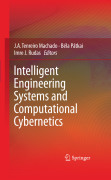
Intelligent engineering systems and computationalcybernetics
Machado, J.T.
Pátkai, B.
Rudas, I.J.
Engineering practice often has to deal with complex systems of multiple variable and multiple parameter models almost always with strong non-linear coupling. The conventional analytical techniques-based approaches for describing and predicting the behaviour of such systems in many cases are doomed to failure from the outset, even in the phase of the construction of a more or less appropriate mathematical model. These approaches normally are too categorical in thesense that in the name of ‘modelling accuracy’ they try to describe all the structural details of the real physical system to be modelled. This can significantly increase the intricacy of the model and may result in a enormous computational burden without achieving considerable improvement of the solution. Thebest paradigm exemplifying this situation may be the classic perturbation theory: the less significant the achievable correction, the more work has to be invested to obtain it. State of the art in the subject INDICE: From the contents Part I Intelligent Robotics.- Part II ArtificialIntelligence.- Part III Computational Intelligence.- Part IV Intelligent Mechatronics.- Part V Systems Engineering.- Part VI Mathematical Methods and Models.- Part VII New Methods and Approaches.- Index.
- ISBN: 978-1-4020-8677-9
- Editorial: Springer
- Encuadernacion: Cartoné
- Páginas: 490
- Fecha Publicación: 01/07/2008
- Nº Volúmenes: 1
- Idioma: Inglés
